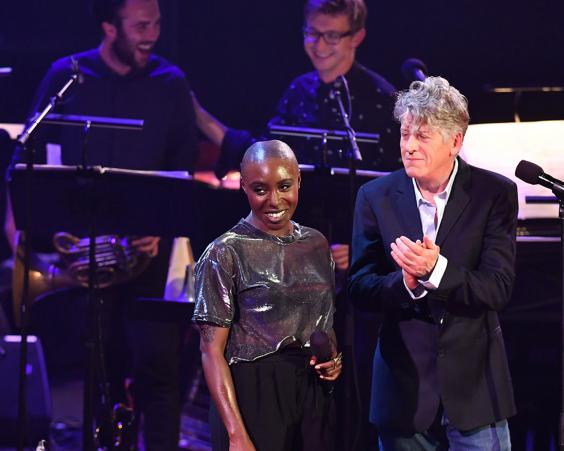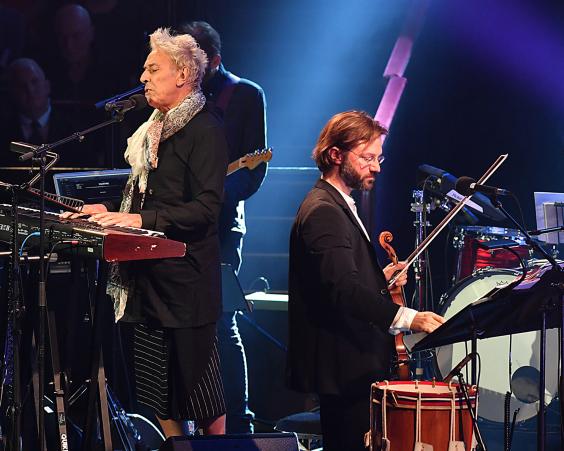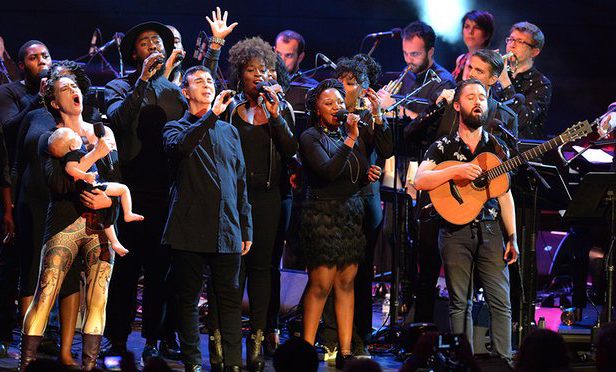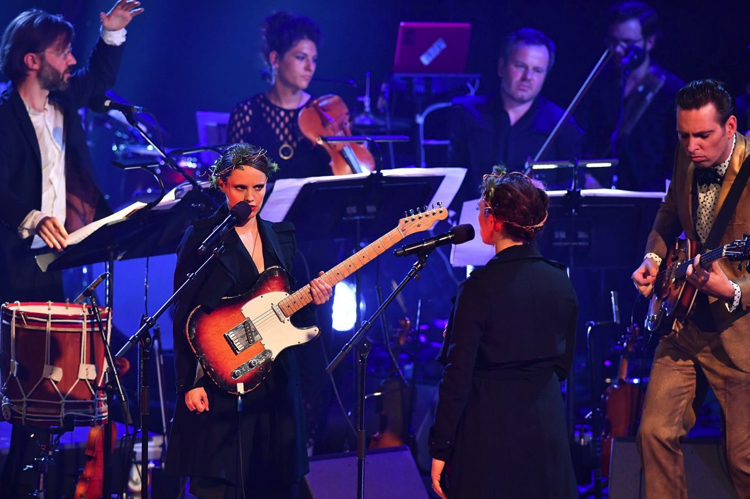The Prom took us from the brooding Cold War-evoking Warszawa to a joyous instrumental Let’s Dance, with the audience providing the vocals
audio
Track 01 Radio Three introduction 2:12
Track 02 6Music introduction and interviews 11:43
Track 03 Warszaw (aarr s t a r g a z e) 4:35
Track 04 Station to Station (Neil Hannon, Amanda Palmer, Conor O’Brien) 7:09
Track 05 The Man Who Sold the World (Conor O’Brien) 5:35
Track 06 This Is Not America (Elf Kid, Neil Hannon) 5:24
Track 07 Life On Mars (Marc Almond, arr Anna Meredith) 5:30
Track 08 Lady Grinning Soul (Anna Calvi, Jherek Bischoff, arr Jherek Bischoff) 6:40
Track 09 Ashes to Ashes (Paul Buchanan, Jherek Bischoff, arr Jherek Bischoff) 5:59
Track 10 Fame (Laura Mvula, arr Greg Saunier) 5:29
Track 11 Let’s Dance (arr Greg Saunier) 1:41
Track 12 Girl Loves Me (Laura Mvula, Paul Buchanan, arr s t a r g a z e) 5:44
Track 13 I Can’t Give Everything Away (Paul Buchanan, arr Josephine Stevenson) 6:23
Track 14 Blackstar (Anna Calvi, Amanda Palmer, Jherek Bischoff, James McVinnie, arr Jherek Bischoff) 11:33
Track 15 “Heroes” (Anna Calvi, Amanda Palmer, Jherek Bischoff, arr Jherek Bischoff) 4:05
Track 16 Always Crashing in the Same Car (Philippe Jaroussky, arr David Lang) 6:16
Track 17 Starman (Marc Almond, arr Anna Meredith) 6:39
Track 18 Rebel Rebel (Members of the House Gospel Choir, arr Greg Saunier) 1:27
Track 19 Valentine’s Day (John Cale, arr John Cale) 6:22
Track 20 Sorrow (John Cale, Anna Calvi, arr John Cale) 5:49
Track 21 Space Oddity (John Cale, House Gospel Choir, arr John Cale) 9:14
Track 22 After All (Conor O’Brien, Marc Almond, Philippe Jaroussky, Amanda Palmer, James McVinnie) 6:31
Track 23 Let’s Dance (arr Greg Saunier, Jherek Bischoff) 3:34
David Bowie’s last ever UK performance took place at the Royal Albert Hall in 2006. He appeared on stage for 15 minutes as the guest of Dave Gilmour, frontman of Pink Floyd, to sing Comfortably Numb and Arnold Lane.
He would only appear in public a few times after that, surprising people at charity benefits and one-off concerts. With the release of The Next Day in 2013 and his final album Blackstar, two days before his death from cancer in January, he stage-managed himself out of the world, becoming a mythical figure in the eyes of his fans even before he was gone.
The BBC went hard on Bowie’s death. BBC 6Music held a day of special broadcasts. BBC2 changed its scheduling. Plans for the Bowie prom must have got underway not long afterwards. Stargaze, an orchestral collective known for their work with pop artists like Owen Pallett and Villagers, were asked to turn Bowie’s oeuvre into the stuff of proms.
They start standing in the round at the Royal Albert Hall, playing the brooding Warszawa from Low.
Warszawa was conceived by Brian Eno to invoke the desolation of Warsaw at the time of Bowie’s visit in 1973. While the ensemble play, Neil Hannon from the Divine Comedy enters the stage as Stargaze segue into Station to Station. Amanda Palmer from Dresden Dolls stands behind him on backing vocals. Palmer dispels the somber atmosphere after the song.
“The most important thing is that this is not a wake. This is an artful celebration of some of the most beautiful music in the world,” she tells the audience, who applaud from the many corners of the venue.

It never really gets dark in the Hall. Rather ambient lights drench the tiers of spectators in pinks and blues, breaking the fourth wall. This is a receptive crowd, whooping just as much for Elf Kid, a Lewisham grime artist, as Radio 2 darling Laura Mvula. The former raps over This is Not America, a song Bowie wrote for a film, The Falcon and the Snowman. Mvula does Fame. People are clapping along before she even starts singing.

Think of David Bowie’s best orchestral work and it won’t take you long to get to Life on Mars, with it’s furious string passages and ecstatic cello bassline. The Scottish composer Anna Meredith turns the original arrangement on its head for the Soft Cell frontman Marc Almond. He nails the vocal, spreading his arms wide for the high notes. When it’s time for the orchestral interlude, all the notes are turned upside down, quietly crashing into one another in the most breathtaking way, until the verse starts up again. It could be disappointing, instead it’s a triumph of reinvention.
Stargaze director Andre de Ridder told the BBC he was a bit nervous before the concert, the first prom to be streamed live on BBC Four, Radio 3 and 6Music. “I hope we’re not overwhelmed!”
In the end they are somewhat by John Cale’s Space Oddity, which turns out dirge-like for the addition of the house gospel choir. The nimble arrangements cannot survive the number of people onstage. Amanda Palmer even brings our her baby for After All, a nightmarish fan favourite from The Man Who Sold The World, which despite best efforts becomes funereal.
Some of the excitement is lost. But there will be plenty here for the BBC to cut and play out on the radio over the weeks that follow, keeping alive the myth of Bowie that was started by the man himself.

Hazel Sheffield, The Independent:
The BBC went hard on David Bowie’s death (January 10, 2016). BBC 6Music held a day of special broadcasts. BBC2 changed its scheduling. Plans for the Bowie prom must have got underway not long afterwards. Stargaze, an orchestral collective known for their work with pop artists like Owen Pallett and Villagers, were asked to turn Bowie’s oeuvre into the stuff of proms.
They start standing in the round at the Royal Albert Hall, playing the brooding Warszawa from Low.
Warszawa was conceived by Brian Eno to invoke the desolation of Warsaw at the time of Bowie’s visit in 1973. While the ensemble play, Neil Hannon from the Divine Comedy enters the stage as Stargaze segue into Station to Station. Amanda Palmer from Dresden Dolls stands behind him on backing vocals. Palmer dispels the somber atmosphere after the song.
“The most important thing is that this is not a wake. This is an artful celebration of some of the most beautiful music in the world,” she tells the audience, who applaud from the many corners of the venue.
Stargaze director Andre de Ridder told the BBC he was a bit nervous before the concert, the first prom to be streamed live on BBC Four, Radio 3 and 6Music. “I hope we’re not overwhelmed!”
In the end they are somewhat by John Cale’s Space Oddity, which turns out dirge-like for the addition of the house gospel choir. The nimble arrangements cannot survive the number of people onstage. Amanda Palmer even brings our her baby for After All, a nightmarish fan favourite from The Man Who Sold The World, which despite best efforts becomes funereal.
radiotimes.com:
There was brilliance at work – but the experiment never quite lifted off… Let’s be clear, it was billed as a “reinterpretation of the music of David Bowie” and put together by a mismatch of musicians who loved/respected/wanted to honour the spirit and avant-garde creativity of Bowie. To that extent it might be deemed a success.
telegraph.co.uk:
For the first time in Proms history, a pop star’s work was treated as seriously as any classical composer. The results may not have been an unqualified success but this richly imaginative, bold, thoughtful, daring and emotional night amply demonstrated that Bowie fully deserves to be considered an all-time great from any perspective.
Cale illustrated everything that is usually so wrong with the mix of pop and orchestral, where all those fantastic instruments simply end up as gilding to a loud band, offering little more than a veneer of sound like a big synthesizer.
Despite obvious flaws and failed renditions, the Bowie Prom was the most thrilling orchestration of pop I have ever seen because it dared to really reimagine the music.






4.5
4.5